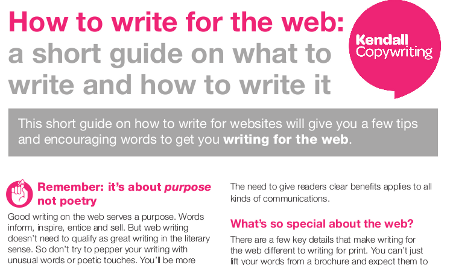Writing for the web? Check out: How to write for the web: a short guide on what to write and how to write it (link opens a sweet PDF in new tab)
It’s free, short and totally excellent.
Or you can read it all here:
How to write for the web: a short guide on what to write and how to write it
This short guide on how to write for websites will give you a few tips and encouraging words to get you writing for the web.
Remember: it’s about purpose not poetry
Good writing on the web serves a purpose. Words inform, inspire, entice and sell. But web writing doesn’t need to qualify as great writing in the literary sense. So don’t try to pepper your writing with unusual words or poetic touches. You’ll be more successful if you focus on communicating with your audience.
Remember your reader
When you write, keep your reader at the forefront of your mind. Who are they? What do they want? Your writing should fulfil your user’s needs.
Write about the benefits
When writing about a product or service, write about the benefits that those products or services offer. So instead of focusing on features and writing:
“Our chain saw blades are made of high-carbon steel”
Highlight how the features of a product or service translate into benefits to the user, like this:
“Cut fast and safe for longer with our high-carbon steel blades.”
What’s the benefit of benefits?
Imagine you’re buying a lawn mower. What do you really want? Do you want a machine that cuts grass or do you want shorter grass? You really want shorter grass; the machine is just a means to an end. Your readers just want shorter grass.
The need to give readers clear benefits applies to all kinds of communications.
What’s so special about the web?
There are a few key details that make writing for the web different to writing for print. You can’t just lift your words from a brochure and expect them to flourish on the web.
Reading on screen
Reading on screen is hard on the eyes. Make it easier:
- Write in short, simple sentences.
- Break up blocks of text with headings.
- Leave white space between paragraphs.
Links: a web of connections
Hyperlinks, or links (the clickable text that leads you from one web page to another) are one of the webs defining features. Use links to provide evidence for your claims, support for your argument or additional resources for your readers.
Search Engine Optimisation (SEO)
Unless your website is optimised for search engines, you could miss thousands of potential visitors. Start by thinking about how people search for a business like yours. Draw up a list of words and phrases (keywords) that people are likely to use. Then copy and paste your list into Google’s Keyword Tool. This will give you a longer list and should include words or phrases you hadn’t originally considered.
You may have a massive list, but you can’t hope to rank well in search results for hundreds of keywords (unless you’re Amazon or the BBC) so focus on the most important keywords. Choose keywords that your customers are likely to use when they’re ready to buy from you, rather than keywords that indicate a searcher looking for information.
For example, if you search for ‘puppies’ you might be looking for pictures or general information about juvenile dogs. But a search for ‘puppy farm’ is more specific and more suggestive of someone who’s ready to buy.
Use your keywords in:
- Copy (the text)
- Headings
- Meta titles
- Meta keywords
- Meta descriptions
Remember who you’re writing for
With SEO, it’s easy to get obsessed with keywords and search results. While it’s wise to understand SEO, you must write for people. Focus on your human audience. If you publish interesting things on the web, people will link to your writing. This is a better, more natural approach to SEO.
Getting discovered
If you want people to find your writing, you’ll need to get in front of their eyes. Write comments on other bloggers’ posts, use social media tools like Twitter and Facebook, and contribute to forums (make sure your signature includes a link to your website) to help people find your website.
Every link to your website has two values: it helps people discover your work, and it improves your website’s search engine performance (search engines consider links to your website to be an indicator of quality).
On Writing
Be nice to your readers: use a spell checker and ask a friend to review your work. Let your words rest overnight before re-reading to make sure they still make sense.
Flex your writing muscles!
The secret to great writing is regular practice. So get writing!
Key Points
- Remember your reader; what do they want?
- Remember your desired result; what do you want to achieve?
- Highlight how features translate into benefits.
- Optimise your writing for the screen with short, simple sentences.
- Use white space, headings and sub-headings to break up text.
- Lead people to your website with links and mentions on forums, blog comments and social networking sites.
- The best way to become a better writer is by writing. So start writing!


Comments
Leave a comment